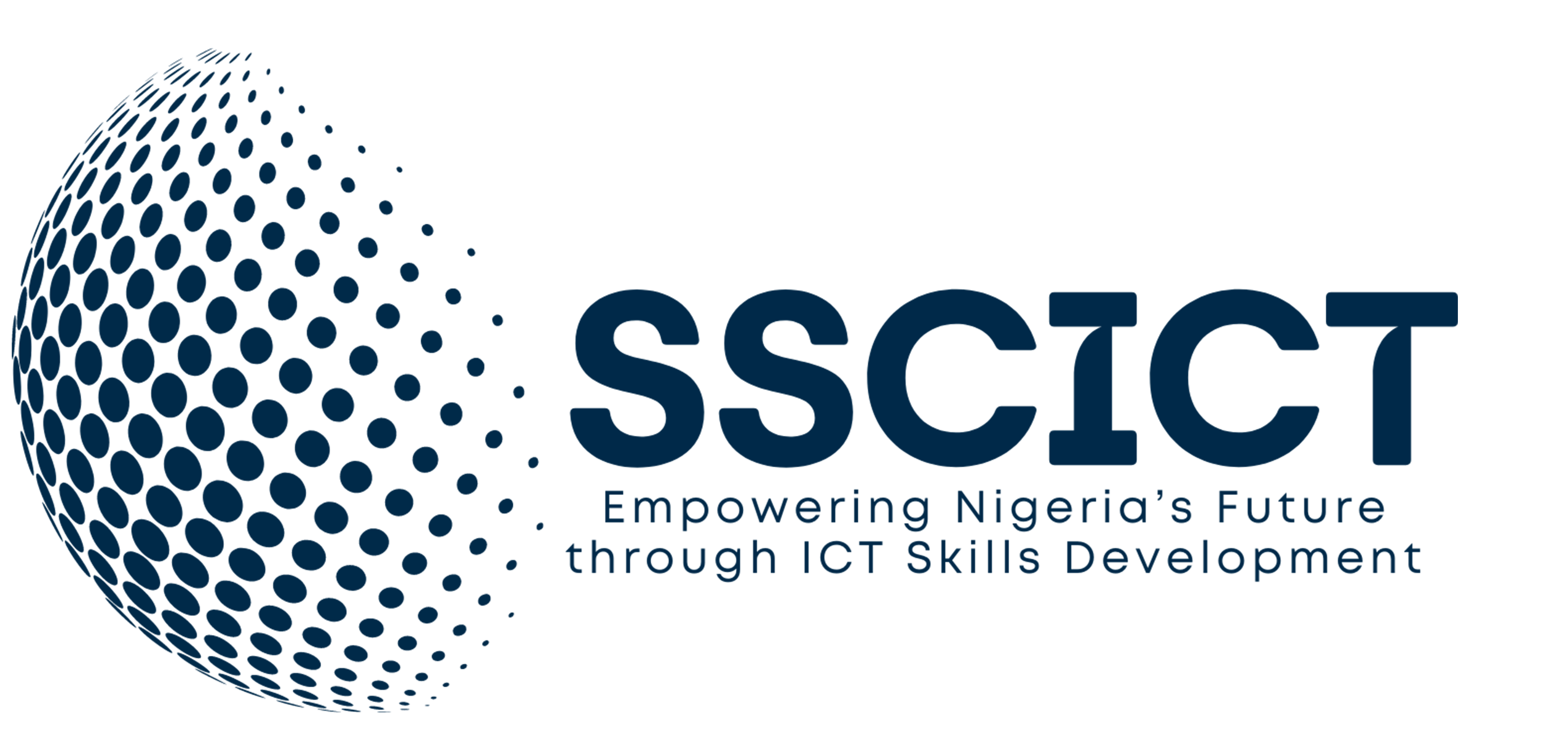Our Work
What We Do
At the Sector Skills Council for Information and Communications Technology (SSC ICT), our work is focused on developing a highly skilled ICT workforce that can meet the evolving demands of Nigeria’s digital economy. We achieve this through developing national standards, implementing industry-relevant qualifications, promoting hands-on training, and fostering collaboration between key stakeholders in the public and private sectors to thrive in today’s digital economy. By developing National Occupational Standards (NOS), creating industry-relevant qualifications, and promoting practical skills training, we are committed to shaping the future of ICT in Nigeria.
Our efforts are centred on closing the ICT skills gap, enhancing the employability of Nigeria’s workforce, and supporting economic growth by providing businesses with access to skilled professionals ready to contribute immediately. Below is a comprehensive overview of the critical areas of our work:

Developing National Occupational Standards (NOS)
What We Do:
One of SSC ICT’s core functions is developing and maintaining National Occupational Standards (NOS). These standards define the competencies, skills, and knowledge required for various roles within the ICT industry. NOS ensures that training programs, certifications, and qualifications across Nigeria are consistent and aligned with industry needs, both locally and internationally.
Why It Matters
National Occupational Standards play a pivotal role in maintaining a high-quality ICT workforce by:
- Ensuring that training programs are designed with industry needs in mind.
- Providing a benchmark for assessing the skills and knowledge of ICT professionals.
- Allowing employers to recruit with confidence, knowing that certified individuals meet recognised industry standards.
How We Do It
- Industry Consultation: We work directly with employers, industry associations, and experts to ensure that our standards reflect the current and future demands of the ICT sector.
- Collaborative Development: We develop NOS that are rigorous, up-to-date, and internationally aligned through committees of industry experts, educators, and government representatives.
- Continuous Review: To keep pace with technological advancements, we regularly update these standards, ensuring that they remain relevant as new roles emerge in areas such as cybersecurity, data analytics, artificial intelligence, and blockchain.
Implementing Industry-Relevant Qualifications
What We Do:
In addition to developing standards, SSC ICT plays a leading role in creating qualifications recognised by employers and educational institutions across Nigeria. Our qualifications are designed to provide a structured pathway for learners, from entry-level positions to advanced technical roles, ensuring a clear progression of skills.

Why It Matters
Qualifications developed by SSC ICT help:
- Ensure that learners acquire the right skills for employment.
- Provide ICT professionals with clear career advancement opportunities.
- Align Nigeria’s ICT education system with international best practices.
How We Do It
- Designing the ICT Qualifications Framework: Based on NOS, we create a qualifications framework that outlines the levels of competencies and skills required for different ICT roles, from basic technical support to advanced software development and IT project management.
- Collaborating with Training Providers: We partner with universities, polytechnics, and private training providers to ensure that the curricula offered align with our qualifications framework. This collaboration ensures that learners are job-ready when they complete their programs.
- International Recognition: By collaborating with international sector skills councils and professional bodies, we ensure that our qualifications are recognised in Nigeria and abroad, making our certified professionals globally competitive.
Promoting and Facilitating Apprenticeships and Internships
What We Do:
SSC ICT actively promotes apprenticeship and internship programs to ensure that individuals can gain practical, hands-on experience in real-world ICT environments. These programs bridge theoretical knowledge acquired in the classroom and the practical skills required in the workplace

Why It Matters
- Apprenticeships and internships offer workplace exposure, critical for building confidence and competence in real-world scenarios.
- They help reduce the mismatch between education and employment, ensuring learners are equipped with skills that meet employer demands.
- Apprenticeships and internships also give businesses an opportunity to shape their future workforce while offering learners valuable work experience.
How We Do It
- Partnering with Employers: We collaborate with ICT companies, government agencies, and businesses from other sectors to create apprenticeship and internship opportunities. These partners help provide trainees with a real-world understanding of ICT roles and challenges.
- Work-Based Learning Models: We promote work-based learning models where trainees split their time between classroom learning and on-the-job training, ensuring they apply what they learn in real-world contexts.
- Mentorship and Support: Our programs include mentorship opportunities, where experienced professionals guide trainees to enhance their learning and personal development.
Engaging Stakeholders for Effective Collaboration
What We Do:
Collaboration lies at the heart of SSC ICT’s work. We engage with a broad range of stakeholders from both the public and private sectors to ensure that our initiatives align with national development goals, industry requirements, and educational standards.

Why It Matters
Effective collaboration ensures that:
- Training programs and standards are aligned with industry demands.
- Public policy supports skills development and addresses national priorities in ICT.
- Educational institutions receive guidance and support in developing curricula that meet industry expectations.
- Employers have access to a skilled talent pipeline that contributes to business growth and innovation.
How We Do It
- Industry Engagement: We work closely with major ICT companies (e.g., MTN, Globacom, Airtel, Andela) to develop training programs that meet their workforce needs.
- Public-Private Partnerships: Through partnerships with government agencies like the National Information Technology Development Agency (NITDA) and the Digital Bridge Institute (DBI), we ensure that our work supports national ICT strategies.
- Educational Collaboration: We engage with universities, polytechnics, and training providers to ensure that curricula align with our standards and qualifications, ensuring a seamless transition from education to employment.
Establishing Quality Assurance Mechanisms
What We Do:
Quality assurance is a key priority for SSC ICT. We develop and implement robust quality assurance frameworks to ensure that all training programs, certifications, and apprenticeship initiatives meet the highest standards of excellence.

Why It Matters
- Quality assurance ensures that training programs produce skilled professionals who are job-ready.
- It helps maintain the credibility of certifications, making them valuable to employers both in Nigeria and abroad.
- It provides a mechanism for continuous improvement, ensuring that standards and qualifications are updated regularly to keep pace with the industry.
How We Do It
- Accreditation of Training Providers: We accredit training providers who meet our rigorous quality standards, ensuring that learners receive high-quality education and training.
- Monitoring and Evaluation: We conduct regular audits and evaluations of programs to ensure they maintain the expected standards and address industry needs.
- Feedback Loops: We engage with employers, learners, and training providers to gather feedback and make necessary adjustments to training programs, qualifications, and certifications.
Providing Research and Labor Market Intelligence
What We Do:
SSC ICT regularly conducts research and gathers labour market intelligence to understand emerging trends, skill shortages, and future workforce needs in the ICT sector. This information informs our decisions on developing new training programs, updating standards, and ensuring our initiatives are relevant.
Why It Matters
- Accurate labour market intelligence helps us stay ahead of industry trends, ensuring that Nigeria’s workforce is equipped with skills that are future-ready.
- It enables us to identify skill shortages and develop targeted interventions to address them.
- It provides stakeholders with data-driven insights to inform workforce planning and policy development.
How We Do It
- Partnering with Employers: We collaborate with ICT companies, government agencies, and businesses from other sectors to create apprenticeship and internship opportunities. These partners help provide trainees with a real-world understanding of ICT roles and challenges.
- Work-Based Learning Models: We promote work-based learning models where trainees split their time between classroom learning and on-the-job training, ensuring they apply what they learn in real-world contexts.
- Mentorship and Support: Our programs include mentorship opportunities, where experienced professionals guide trainees to enhance their learning and personal development.
Ensuring Financial Sustainability and Growth
What We Do:
We are committed to ensuring the financial sustainability of SSC ICT, allowing us to continue offering high-quality training, certifications, and apprenticeships. We achieve this by diversifying our revenue streams and building strategic partnerships.

Why It Matters
- Financial sustainability ensures that SSC ICT can operate independently and continue delivering value to its stakeholders.
- It allows us to expand our reach and offer more training opportunities to individuals and businesses across Nigeria.
- It provides the resources necessary to develop new programs, update standards, and promote innovation in the ICT sector.
How We Do It
- Industry Engagement: We work closely with major ICT companies (e.g., MTN, Globacom, Airtel, Andela) to develop training programs that meet their workforce needs.
- Public-Private Partnerships: Through partnerships with government agencies like the National Information Technology Development Agency (NITDA) and the Digital Bridge Institute (DBI), we ensure that our work supports national ICT strategies.
- Educational Collaboration: We engage with universities, polytechnics, and training providers to ensure that curricula align with our standards and qualifications, ensuring a seamless transition from education to employment.
Through these core activities, SSC ICT is shaping the future of Nigeria’s ICT sector by creating a skilled, adaptable, and globally competitive workforce. Our work ensures that Nigeria remains at the forefront of technological advancements, driving economic growth and fostering innovation.
